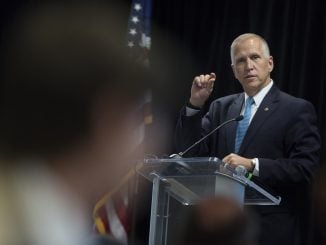
COLUMBIA, S.C. — A yearslong bid by the South Carolina-based Catawba Indian Nation to build a casino and resort in North Carolina could stall once again following a lawsuit by North Carolina-based Eastern Band of Cherokee Indians, the latest development in a casino turf war between the two tribes.
The Eastern Band of Cherokee Indians filed an amended complaint against the U.S. Department of the Interior this week, challenging the federal government’s approval in March for a Catawba casino development on land near Interstate 85 in Kings Mountain, just west of Charlotte, into trust for the planned Catawba casino.
The amended complaint this week is part of a lawsuit filed in federal court in D.C. by the Cherokee tribe in March, five days after the agency’s decision. A judge denied a motion by the Eastern Band for a preliminary injunction in April, finding the plaintiffs did not establish irreparable harm.
The plaintiffs, including the Cherokee tribe and a dozen of its members residing near the Kings Mountain site, say the land is historically theirs. They say per the legal process the government is supposed to follow to acquire trust land for the Catawba tribe, that land must be in South Carolina.
Strict laws in South Carolina prohibit most forms of gambling in the state.
The lawsuit also alleges the Department of the Interior violated legal requirements by not consulting with the Eastern Band of Cherokee Indians to identify and protect cultural resources at the site, and not examining potential environmental impacts of the proposed development.
“We welcome the growing coalition that is fighting against the DOI’s decision,” said Richard G. Sneed, principal chief of the tribe, in a statement Wednesday.
Catawba Chief Bill Harris indicated plans for the casino are moving forward, including a groundbreaking scheduled later this month at the site.
“We are confident that the judge will find that the Department of Interior followed all federal laws and made the proper decision regarding our application,” Harris said in a statement Wednesday.
The plaintiffs allege that a South Carolina casino developer named Wallace Cheves is behind the acquisition.
They noted that two Catawba-connected businessmen pleaded guilty in 2007 in a scheme to funnel Catawba funds to political candidates seeking to reverse South Carolina’s ban on gaming.
In a statement Wednesday, the Cherokee tribe said Cheves “prevailed on the Catawba to try its luck in North Carolina.”
Cheves did not respond to a request for comment Wednesday afternoon.
“This decision empowers the Catawba Indian Nation to pursue economic development opportunities for the benefit of its members and community,” DOI spokesperson Conner Swanson said. Swanson said the decision to approve the site “was reached after an extensive review process as established under law, and the Department stands behind its decision.”
In March, the federal government approved the Catawba tribe’s use of 16 acres across the state border in North Carolina, about 35 miles northwest of the Catawba reservation in upstate South Carolina.
An economic development evaluation of the project cited in the government’s decision found the $273 million investment in the entertainment complex could generate more than 1,600 construction jobs and create more than 3,000 direct and indirect jobs once built.
The federal government’s decision said the Catawba tribe had “both a tribal population and governmental presence in North Carolina where the site is located.”
The tribe provides health care, employment and other services in a multi-county, two-state area that includes 253 members living in North Carolina, the document said: “Though the site falls within an area where another tribe may assert aboriginal ties, that fact does not detract the Nation’s ties to the land.”
The Eastern Band of Cherokee Indians currently runs two casinos in the mountains of North Carolina.
Last year, North Carolina Sens. Richard Burr and Thom Tillis and South Carolina Sen. Lindsey Graham introduced a bill that would have directed the Department of Interior to authorize gambling on the land.



